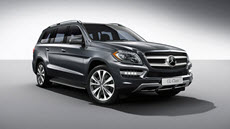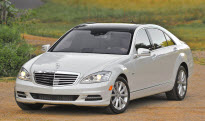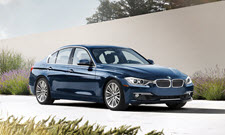 EXECUTIVE SUMMARY
EXECUTIVE SUMMARY
The Vincentric Diesel Analysis showed that of the 35 diesels measured, 11 had total cost of ownership that was lower than their all-gasoline powered counterparts.
The average price premium for a diesel was $5,390, with average fuel cost savings of $855. When all costs to own and operate a diesel were taken into account, the average cost of ownership for diesels was $2,754 more than their all-gasoline powered counterparts. The range between the best and worst savings was significant, with the 2014 Mercedes-Benz GL350 BlueTEC saving buyers $7,789 while the 2014 Chevrolet Express Diesel G3500 Wagon cost buyers $13,327 more to own. The full study is published below.
DIESEL ANALYSIS
There are many different approaches for comparing diesels to their all-gas counterparts. At Vincentric, we have prepared different reports to help users to understand the financial dynamics of diesel vehicles. By doing so, we enable users to better understand the expected costs (or savings) of driving a diesel, resulting in the ability to make a more informed decision when considering the purchase of a diesel vehicle.
Fuel prices used in these reports are based on a weighted average over the previous five months, so you may notice that they don't necessarily reflect current prices during times of rapid fuel price changes. This is done to help ensure that the analysis reflects current market trends and not market extremes.
The reports assume 15,000 miles are driven annually, and the vehicle is owned five years. It is also worthwhile to understand that the numbers shown are U.S. averages, although the same analysis can be done for any state or the District of Columbia.
Please note that the analysis and reports below use data from November 2014. Vincentric compares diesel vehicles to their all-gas counterpart based on a similar trim level. Cost differentials may differ if other trims are analyzed.
COST OF OWNERSHIP and FUEL COST COMPARISON
U.S. consumers have been slow to embrace diesel passenger vehicles. There has been a lack of understanding of the benefits of clean diesel technology. This report demonstrates that in addition to improved environmental benefits of diesels, a strong financial case can be made for the adoption of some of these vehicles. However, consumers seeking shelter from high gas prices won’t always find the relief they expect by turning to diesels. In this analysis, there were 11 diesels that can be financially justified purely based on the total cost of ownership numbers.
 2014 Mercedes-Benz GL350 BlueTEC (-$7,789)
2014 Mercedes-Benz GL350 BlueTEC (-$7,789)- 2014 Mercedes-Benz E250 BlueTEC (-$3,860)
- 2014 BMW X5 Diesel (-$2,358)
- 2014 BMW 328d (-$2,324)
- 2014 Mercedes-Benz GLK250 BlueTEC (-$1,979)
- 2014 Mercedes-Benz ML350 BlueTEC (-$1,613)
- 2014 BMW 535d (-$1,420)
- 2014 Audi Q5 Diesel (-$1,189)
- 2014 Audi A7 Diesel (-$748)
- 2014 Audi A6 Diesel (-$600)
- 2014 Ram ProMaster Diesel 1500 (-$518)
In addition to carbon emission improvements, diesels are known for their improved fuel economy. The models that provide the greatest benefit over their gas only counterparts are:
 2014 Mercedes-Benz GL350 BlueTEC (-$4,060)
2014 Mercedes-Benz GL350 BlueTEC (-$4,060)- 2014 Audi A6 Diesel (-$3,023)
- 2014 Audi A7 Diesel (-$2,853)
- 2014 Mercedes-Benz E250 BlueTEC (-$2,841)
- 2014 Audi A8 L Diesel (-$2,655)
Of course for those who are looking to minimize fuel purchases, it is important to know the diesel vehicles with the lowest overall fuel costs. They are:

- 2014 BMW 328d ($8,207)
- 2014 Volkswagen Jetta TDI ($8,767)
- 2014 Volkswagen Golf TDI ($8,767)
- 2014 Volkswagen Passat TDI ($8,930)
- 2014 Mercedes-Benz E250 BlueTEC ($8,948)
Further detail regarding the cost of ownership and fuel consumption for each diesel and its all-gasoline counterpart can be found by clicking the links below.
Diesel Analysis Cost of Ownership Comparison: Excel Report or PDF Report 
WHY DO OWNERSHIP COSTS DIFFER BETWEEN DIESELS AND THEIR GAS COUNTERPART?
In most cases studied, the diesel vehicle had a higher market price than its gas alternative, which causes several cost factors to increase including finance, opportunity costs, and fees & taxes. The Diesel Analysis also shows that diesels typically have slightly higher insurance, repair, and maintenance costs. However, in most cases diesels offer lower fuel expenses compared to their all-gas counterpart due to their improved MPG. In addition, on a percentage basis, diesels have lower depreciation, but due to a higher purchase price, their total depreciation costs are higher. Therefore, it’s important for consumers to look at their needs and the specific models available to them because depending on the current deals, driving patterns and intended length of ownership a diesel can still be a great value.
To view the press release regarding the Vincentric Diesel Analysis, click here.
|

If you are interested in learning more about other Industry Reports from Vincentric, click here.
|